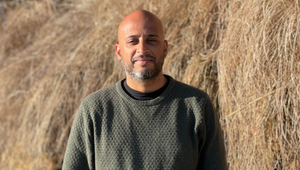
5 Minutes with… Daniel Bergmann

Stink is a production company that needs no introduction, but few will know it’s success has been built on one startlingly simple idea – founder Daniel Bergmann wanted to create a production company that was truly global, not only in the talent it represented but also in the projects it worked on. Using the experience his gained in his early career, within the international art scene, Bergmann has established one of the most famous and award-winning production companies in the world. He credits his time promoting artists and holding exhibitions in his native Prague as the secret to his success and even though he’s now a big name in advertising, Bergmann never truly left his love of art behind… In 2008, he launched Studio, the art division of Stink and is a judge at this year’s Higher Pitch Art Sells exhibition.
LBB> You started off working in the Prague art scene – when was this and how do you think this early experience has influenced your subsequent work and directions?
DB> Prague was still under communist rule. Some artists were part of the system and in exchange they could travel and put on exhibitions, but there were other people who were far more principled. It was a polarised environment, it was very noticeable that there was an ‘us and them’ situation. I guess this influenced my thinking and work – I learned to stick to my principles and not to sell out. You have to be intelligent about the process and make sure you don’t compromise too much.
LBB> How and why did you leave the art scene and move into producing?
DB> I never left the art scene. I just started to produce art-related projects and putting on events where I invited bands to come along. This led to music videos and then I started working on feature films. I got so busy with that, it became my main activity – but I never completely left art.
LBB> When you first left Stillking to move to London and found Stink in 1997, what was your original vision for the company and how has that vision evolved over the years?
DB> When I moved to London, English production companies and agencies were very anglo-centric. They believed that the talent was mainly in the UK and perhaps the US. Before I started working in production, I moved to New York and had experience working with lots of artists from different parts of the world. I wanted to have a company that was open to all kinds of directors from many countries. We set up in London because of its creative power and geographical position, but the idea was to have an open production company which is purely orientated on creative talent without being territorial.
LBB> Founded in 2008, Studio [originally launched as Direkt Art] draws on your roots as an artists’ agent and promoter. Why do you think it’s important to connect brands and artists, and how have you found managing the potentially difficult relationship between commerce and art?
DB> Traditionally you’d get brands – usually big financial companies – who would commission a piece of art, but money has disappeared from the banking sector and other sectors of society, so the model has had to change. It’s more commercial. In the past when a bank wanted a sculpture, they would look at a few artists and choose one to make a beautiful piece of art for their lobby. Now it’s much more about using art as a marketing tool. Basically this means if a brand wants to put money into art, they want something more tangible back. It’s not easy because agencies don’t know much about it. There are some open-minded people in agencies, but not many.
Overall there’s not yet a strong belief in using art within advertising because its effects are so hard to measure. We are thinking about how we can work with our digital company to create projects which are more measurable because they have an afterlife or parallel online campaign. You have to work very closely with clients and creatives to really make a clear connection between the art and its impact. It’s quite a lot of work. There are some areas which are easier, like fashion, but that’s notorious for not having much money. Art is not on a ‘must’ list when a client is thinking about a campaign. We’re trying to make it more relevant.
LBB> Speaking of art, you’ve been involved as a judge with this year’s Higher Pitch Art Sells exhibition – why did you get involved and what has that experience been like?
DB> I had been thinking of building some kind of platform for creatives to express themselves and share the ideas they wouldn’t be able to sell to clients. I’ve always liked the idea of Higher Pitch. I thought the original ‘woman only’ concept was brilliant and opening up to everyone is the logical next step for them. I was flattered to be asked to judge.
LBB> The nice thing about Art Sells is that it encourages people to share the projects they create for pleasure rather than work – I was wondering if you do any art yourself?
DB> I used to paint a long time ago, but I haven’t done any for many years. I might take photographs but to be honest they’re not artistic, they’re just photos.
LBB> The Stink network includes offices in Shanghai and Moscow – how have you found moving into these markets and what lessons have you learned?
DB> My experience in Shanghai has been good. It’s a thriving office and the scene there is growing creatively and changing quite fast. I can see the developments that I have experienced in other parts of the world, like Prague. It’s gone from something that is quite product-focused and hard-sell-orientated, to a business which is much more creative and experimental. It’s similar to the United States in some ways. China is a big country with a large car market. It has really big cities, but at the same time many people live in the countryside. As with the United States, this means that nationwide campaigns have to please the people in the cities and the people in the countryside… that’s hard to do.
In Russia, it’s all about Moscow. It’s about luxury goods and fashion. It’s behind China, in many ways – I don’t really want to say it but the industry is at an earlier stage of development. There are some good creatives in Russia and they have a very interesting sensibility.
LBB> In fact the Stink Network seems to be continually expanding, for example the opening of a New York office for Stink Digital. At a time of global recession, this may seem counter intuitive – why did you decide on a bold strategy like this?
DB> We always planned a digital office in the United States because that’s the biggest market and that’s where the new technology is. We are slowly expanding, but at the moment we want to build on the divisions that we now have.
In terms of the financial situation, when you come across hard times you have to have enough tentacles in different places; I believe this is important. There are two solutions; either you keep your company very, very small, which means you have a very careful operation, or you have access to different places. We are a creatively-orientated company – the critical mass of creative work in one market is not enough for the directors and creative people working at Stink. We have to have access to various places to be able to generate interesting work.
I wouldn’t say there was a global recession. A global stagnation perhaps, but I’ve got offices in Shanghai, Moscow and Sao Paulo where the markets are growing like crazy. There’s a recession in some places but there’s no recession for Stink.
LBB> Are awards important to you – if so why? If not, why not?
DB> There are too many award shows. There are a few which I’m really motivated to enter. I really rate One Show because it’s quite creatively orientated and modern - it doesn’t seem too business orientated like Cannes. I’m super-past D&AD. It’s became too big. They’ve opened up to international work, which I think is fine but they did it on such a big scale that it kind of lost its focus for us. Maybe it’s more interesting for architects and designers, people who work on book design and typography, but for our business it’s just not focused. I still rate it though; it’s not financially orientated which is good.
With Cannes and everything owned by Cannes (Spike and Eurobest), I find the balance is more tipped towards making profit. It feels like a business, it’s much more political and I believe that it’s not 100 per cent objective like D&AD and the One Show. Of course it’s not bad, but it’s just financially orientated.
And then you get the shows, like APA or AICP, which I rate very highly. They’re not competitions, they’re just shows of the top 50 or top 100 pieces of work and they’re very objective.
More and more people are talking quite highly about The Effies and I think I want to go to one of them… I am quite intrigued.
LBB> What are the big challenges facing production companies at the moment?
DB> I think a lot of people are thinking about the future, but the important thing is to stay calm and focused on making good work. You have to move inside the system and live it, influence the trends and be part of it. I think it’s better to be proactive than reactive. I hear people say “oh we haven’t done this or that, maybe we are too late to get into digital”, but really if you do brilliant work you will usually be alright. It’s important not to get too distracted about what’s happening in the press.
LBB> Is there anything that you’ve worked on over the last 12 months that has particularly resonated with you and you’ve enjoyed?
DB> I really enjoyed working with Wieden + Kennedy and Adam Berg on the Nike campaign, ‘My Time Is Now’ [http://bit.ly/JefE55]. We always like working on Honda projects, they are always very creative scripts, and Stella is always enjoyable because they are very collaborative. I liked working with BBH on ASOS [http://bit.ly/q6D1D3]. That was an online campaign working with street dancers, and I think it was one of my favourites from the last year. Generally the projects we like to work on are ones where we can collaborate and are part of the process from the beginning to the end.















